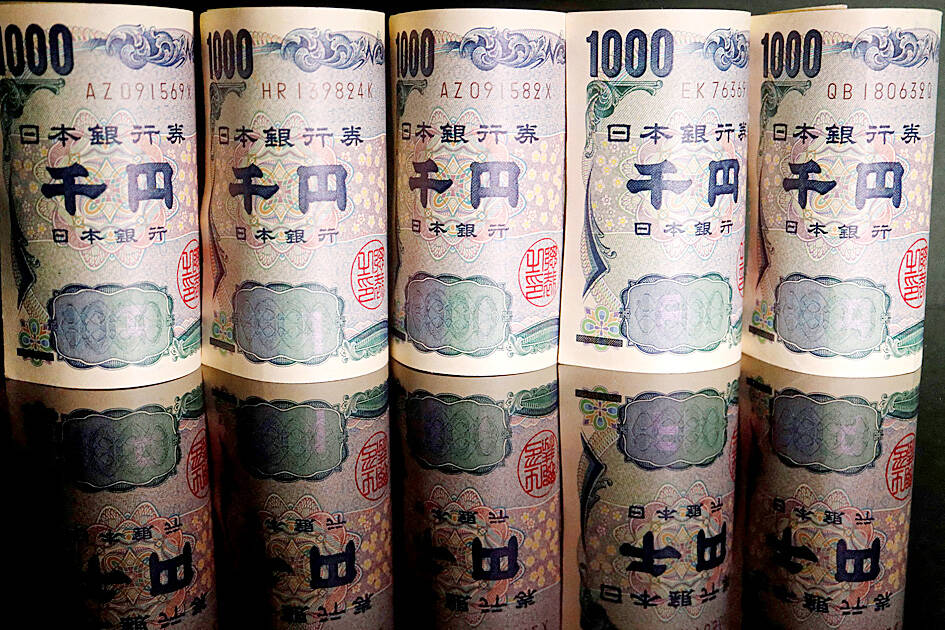The IMF said that it sees no factors that would compel Japan to intervene in the foreign exchange market to support the yen.
“We don’t see any conditions,” Sanjaya Panth, deputy director for the IMF’s Asia and Pacific Department, told reporters on Saturday at the annual gathering of the IMF and World Bank in Marrakesh, Morocco. Pantha cautioned that he was not speaking on behalf of the Japanese authorities, who he said “may know things I don’t” about the situation.
Panth said the yen’s depreciation has been mostly driven by interest rate differentials, reflecting economic fundamentals as inflation rises elsewhere while the Bank of Japan (BOJ) sticks with its ultra-loose policy to generate stable inflation.

Photo: Reuters
The IMF is not seeing key criteria that would support a need for intervention, namely dysfunction of markets, financial stability risks or de-anchoring of inflation expectations, he said.
Whether Japan would intervene to support the yen has been a key focal point lately, with the currency staying near ¥150 per US dollar.
Panth’s remarks come a day after Japan’s top currency official sent a warning to traders, directly hinting at the possibility of intervention by G20 counterparts if the yen moves excessively.
The veteran IMF official refrained from forecasting the timing for the end of negative interest rate and a yield curve control. There are both upside and downside risks for Japan ranging from inflation expectations to the outlook of the global economy, Panth said.
BOJ watchers are seeking clues to whether the bank would adjust its policy on Oct. 31, with a widely expected upgrade in inflation outlook. Concerns over inflationary pressures have grown in global financial markets in the wake of a war between Israel and Hamas, which has been seen as a potential threat to oil markets if the conflict spreads through the region.
“We’re still talking about two more weeks, three more weeks, a lot of things are happening in the world,” before the next BOJ meeting, Panth said. “I’m not going to try to predict what the Japanese authorities are going to do, except to say that I’m quite confident that they’ll look at it very carefully and make the right call.”
Some economists are now paying more attention to the IMF’s view on BOJ policy. In July, IMF chief economist Pierre-Olivier Gourinchas said the BOJ should have moved away from the yield curve control a few days before the bank adjusted it in Governor Kazuo Ueda’s first surprise move.
The IMF has raised its forecasts for Japan’s price gains, projecting that inflation in the world’s third-largest economy would run much hotter than the BOJ’s 2 percent target over the next year.
Japan’s key inflation measure has stayed above the price goal for a 17th month. Since the latest quarterly outlook report in July, the yen has weakened and oil prices have risen, boosting market expectations for the central bank to raise its projection again.
“There’s much more scope now than there has been for a very, very long time in Japan that inflation is going to remain [at] 2 percent or the 2 percent target would be achieved,” Panth said. “The probability of that happening has certainly increased much more than in the past.”
The IMF now sees Japan’s consumer prices rising 3.2 percent this year and 2.9 percent next year, compared with 2.7 percent and 2.2 percent respectively, forecast in April.

Intel Corp chief executive officer Lip-Bu Tan (陳立武) is expected to meet with Taiwanese suppliers next month in conjunction with the opening of the Computex Taipei trade show, supply chain sources said on Monday. The visit, the first for Tan to Taiwan since assuming his new post last month, would be aimed at enhancing Intel’s ties with suppliers in Taiwan as he attempts to help turn around the struggling US chipmaker, the sources said. Tan is to hold a banquet to celebrate Intel’s 40-year presence in Taiwan before Computex opens on May 20 and invite dozens of Taiwanese suppliers to exchange views

Application-specific integrated circuit designer Faraday Technology Corp (智原) yesterday said that although revenue this quarter would decline 30 percent from last quarter, it retained its full-year forecast of revenue growth of 100 percent. The company attributed the quarterly drop to a slowdown in customers’ production of chips using Faraday’s advanced packaging technology. The company is still confident about its revenue growth this year, given its strong “design-win” — or the projects it won to help customers design their chips, Faraday president Steve Wang (王國雍) told an online earnings conference. “The design-win this year is better than we expected. We believe we will win

Chizuko Kimura has become the first female sushi chef in the world to win a Michelin star, fulfilling a promise she made to her dying husband to continue his legacy. The 54-year-old Japanese chef regained the Michelin star her late husband, Shunei Kimura, won three years ago for their Sushi Shunei restaurant in Paris. For Shunei Kimura, the star was a dream come true. However, the joy was short-lived. He died from cancer just three months later in June 2022. He was 65. The following year, the restaurant in the heart of Montmartre lost its star rating. Chizuko Kimura insisted that the new star is still down

While China’s leaders use their economic and political might to fight US President Donald Trump’s trade war “to the end,” its army of social media soldiers are embarking on a more humorous campaign online. Trump’s tariff blitz has seen Washington and Beijing impose eye-watering duties on imports from the other, fanning a standoff between the economic superpowers that has sparked global recession fears and sent markets into a tailspin. Trump says his policy is a response to years of being “ripped off” by other countries and aims to bring manufacturing to the US, forcing companies to employ US workers. However, China’s online warriors